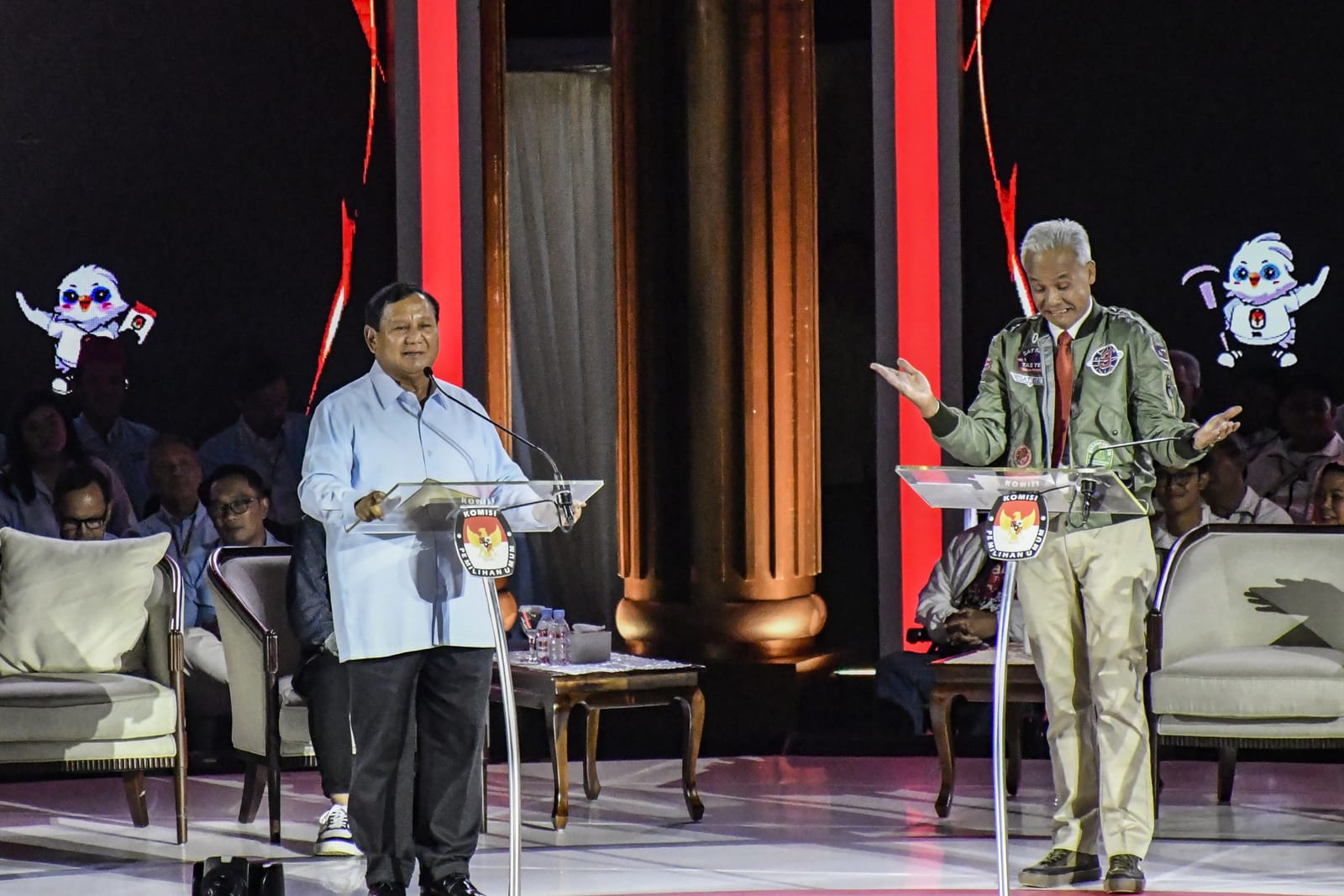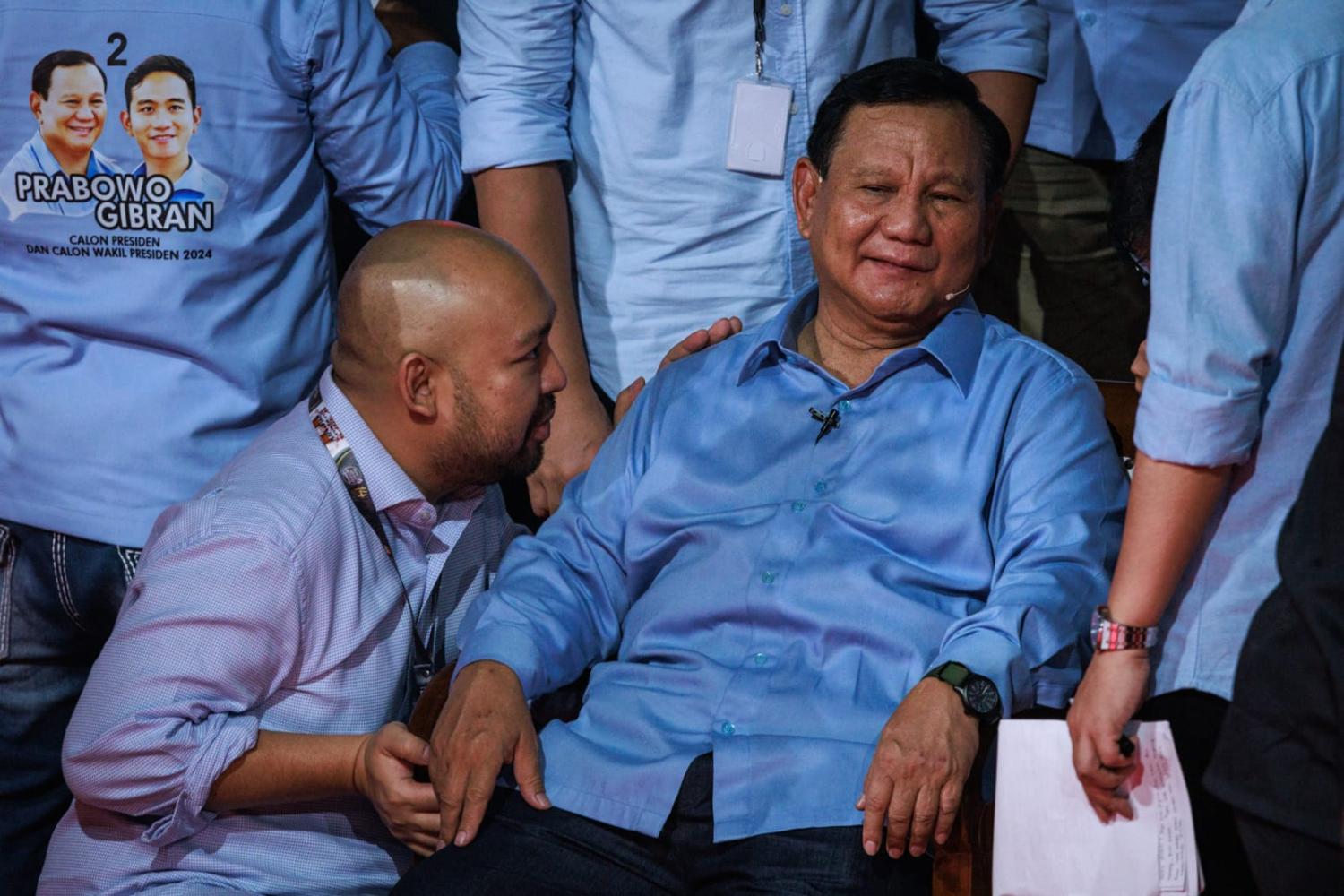Indonesia’s presidential election is heating up – so much that poll leader Prabowo Subianto nearly lost his cool. A televised debate between the candidates on defence and international affairs this month turned contentious. But Prabowo’s quick temper may not cost him victory.
The 7 January debate between the three presidential hopefuls saw fellow contender Anies Baswedan focused on Prabowo’s weak spot, his temperament. By provoking a reaction, Anies apparently wanted to show Prabowo, who currently serves as the defence minister and has twice previously run for the top job, lacked the temperament for composed, level-headed leadership.
Former Central Java governor Ganjar Pranowo holds the third ticket, and this was the third of five debates conducted by the General Elections Commission (KPU) leading up to election day 14 February.
Anies kicked off his opening statement with an attack on Prabowo’s track record in cabinet.
Anies is the former Jakarta governor, so chided Prabowo that the defence ministry has a large budget but couldn’t protect its website from a 2023 hack. In a bid to up the ante, and apparently referring to Mirage jet fighters from Qatar, Anies said the ministry that Prabowo leads plans to buy used primary weaponry hardware but half its troops don’t have housing.
According to the 2024 state budget, the defence sector is allocated 139.1 trillion rupiahs (US$9.27 billion) or 5.6 percent of total central government expenditure.
Ganjar piled in, also questioning the purchase of used jet fighters, which would require three years training for air force personnel as part of the technology transfer.
Appearing ruffled, Prabowo explained that military aircraft and warships have a 25-30 year life span. The plan to buy Mirage fighters from Qatar, he said, was no problem as they could still fly another 15 years, and buying new planes requires a longer delivery period of up to seven years.
Ganjar then sought to turn the debate to defence strategy, declaring he would prioritise naval capacity.
“No attack will come overland as Indonesia is an archipelago. Thus, the sea must be fortified,” Ganjar replied to a question from Prabowo on what defence area he would prioritise and how the budget would be increased to satisfy that need. He said the Indonesian Navy has told him it needs sensor technology and sonars to guard the country from seaborne attack. Ganjar pledged to increase the defence budget up to two per cent of Indonesia’s gross domestic product – up from 0.78 per cent presently. This can be achieved by boosting economic growth from the present five per cent to seven per cent, Ganjar said, allowing domestic defence industries to build tanks, helicopters and submarines, and enhance cyber technology.
This back-and-forth amounted to little more than standard political posturing, the costings rubbery, the commitments vague. But on foreign affairs, one critical question raised was the South China Sea. China’s “nine-dash-line” unilaterally claims an expanse of ocean more than 2000 kilometres from its shores, including overlapping Indonesia’s exclusive economic zone.
Anies said the issue, which involves claimants from across Southeast Asia, must be settled through a collective mechanism approach with ASEAN, including via the heads of state forum. The president acts the diplomatic commander, he stressed, which follows Indonesia’s recent chairing of ASEAN.
Ganjar, for his part, noted this collective approach is difficult because of the multitude of interests each state brings to the regional organisation. No agreement has been reached from the prolonged 20-year talks over a code of conduct relating to the South China Sea, Ganjar pointed out.
With the modernisation of weapons systems that China is expected to achieve in the coming years, conditions could become more alarming. Ganjar said Indonesia needs a temporary agreement (with China) to prevent conflict escalation, without elaborating what a provisional deal amounts to.
Meanwhile, Prabowo views settlement of the North Natuna Sea issue, where China’s claim intrudes, requires Indonesia to build its military capability. He said the welfare of soldiers must also be scaled up so that they can carry out their duties.

The presidential hopefuls would be well served to review the 2024 Annual Press Statement delivered by Foreign Minister Retno Marsudi the day after the debate. It is possibly Retno’s last statement before a new foreign minister under a new president succeeds her. She reviewed the achievements and challenges in Indonesia’s foreign policy in her nine years serving as foreign minister to President Joko Widodo, setting a high bar for her successor to reach.
Following the two-and-a-half-hour debate, the Jakarta daily Kompas polled by phone 210 respondents throughout Indonesia. It found that Ganjar scored an almost 80 per cent approval rating, Anies winning over more than 70 per cent, leaving Prabowo scraping just below 49 per cent. Although hardly a definitive measure, the result was illustrative that Prabowo was on the backfoot throughout the debate in an area in which he should be comfortable, given his past role as a general and present ministerial responsibility. Numerous electability surveys report Prabowo scores around 40 percent in general. It is his running mate, Gibran Rakabuming Raka, mayor of Surakarta city in Central Java and President Widodo’s first son, who is the apparent vote catcher. The high approval rating Widodo maintains apparently rubs off on his son.
If on election day no candidate captures more than 50 per cent of the vote, the presidential contest goes to a second round in June in a run-off between the top two candidates. The big questions are whether Prabowo can win in one round – or if Anies and Ganjar might consider a coalition when a second round is required?

